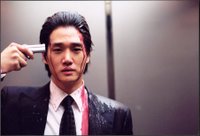 Films like Old Boy and Silmido are making waves amongst arthouse cinema fans and movie industry talent-spotters throughout the western world.
Films like Old Boy and Silmido are making waves amongst arthouse cinema fans and movie industry talent-spotters throughout the western world. It now seems that its not only Hollywood that is turning its eyes westwards to follow the latest cultural carrying-ons in Korea.
The New York Times China's Youth Look to Seoul for Inspiration by Norimitsu Onishi (January 2, 2006) has an interesting article on how Chinese young people are looking to Korea is the tastemakers in popular culture.
The country's cultural exports are cutting-edge tempered with the Confucian-based culture familiar to Chinese audiences. American culture is too 'post-modern' to be absorbed directly and in a Basil Fawlty-esque way Japan is still beyond the pale because of the War. Taste making goes beyond pop singers and movies to hip brands such the must-have mobile phone from Samsung and Hyundai cars.
Rather like Eric Clapton adapting the blues for white audiences in the UK; so Korea is adapting western idioms from hip-hop culture and sit-coms like Sex in the City and making them palatable for East Asian audiences. Free trade and intellectual property protection is likely to not be as beneficial to Hollywood in tapping the Chinese market as the media moguls had hoped.